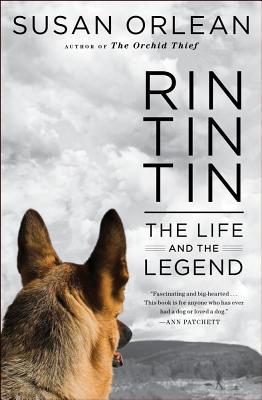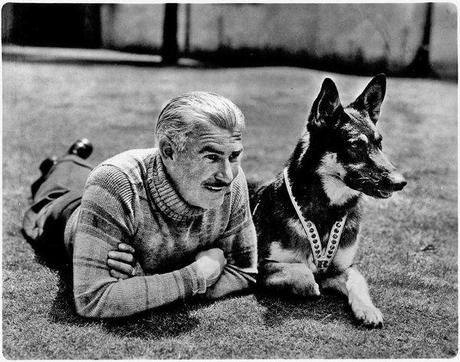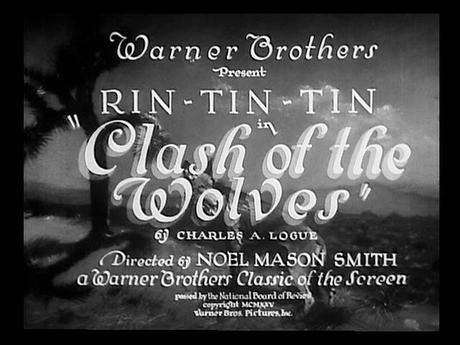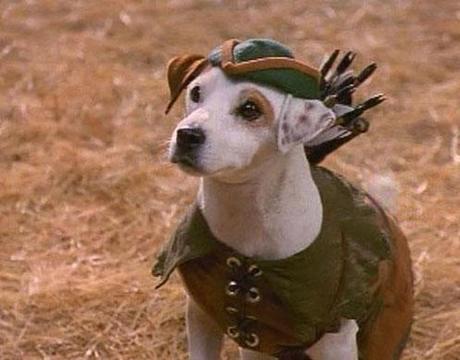
Author Susan Orlean
On Sunday, October 30th, acclaimed author Susan Orlean will visit Book Passage to share her new book, Rin Tin Tin: The Life and the Legend ($26.99). More info and tickets here. Orlean previously wrote the New York Times bestseller The Orchid Thief, which was later used as source material in the 2002 film Adaptation. Orlean has written numerous articles for The New Yorker, where her focus on eclectic people and peculiar passions has riveted readers. Her new book traces the incredible saga of the dog Rin Tin Tin, his owner Lee Duncan, producer Bert Leonard and the dogs and legacy that followed them all. Book Passage staffer Zack Ruskin recently spoke with Orlean about Rin Tin Tin. Their conversation follows.
Zack Ruskin: Rin Tin Tin is your first foray into longform non-fiction since 1998’s The OrchidThief. When did you know this subject was going to be more substantial thana magazine article?
Susan Orlean: UnlikeThe Orchid Thief, I never consideredit as a magazine piece. What happened is that I knew immediately that the scopewas too big to be a magazine story. I always envisioned it as a book. I cameacross this story, picked up the phone, called my agent and said, “This is anamazing story, I’ve got to do a book about this.” And this was on a normal daywhere I hadn’t really been thinking I was going to come across a new book idea,so it came as a surprise to me as well as to my publisher.
Zack Ruskin: Andonce you had this idea, you spent nearly a decade completing this text. Asidefrom how busy you are on a day-to-day level, was there any particular facet ofthe project that required such an immense amount of time?

Zack Ruskin: Nowyou mentioned Lee Duncan a moment ago. Your book is not only the story of thedog, Rin Tin Tin, but also Duncan, his owner. Did Duncan see his dog as a member of his family,or was it more in the onset that the dog was going to be a means to some sortof fortune or wealth for him?
Susan Orlean: Idon’t think it was ever that the dog was his meal ticket. I think he felt thatthe dog was his soul mate. It was almost, I won’t say an afterthought,certainly after he had bonded very deeply with the dog that he began thinking, “Geemaybe he can be in movies.” And I would say that in the long run, he probablyfelt more of a connection to the dog than he ever did to his human family. Youknow, for better or worse, I think it was a different kind of connection thatwas just deeper.

Lee Duncan with Rin Tin Tin
Zack Ruskin: Oneof the publicity blurbs for your book describes Rin Tin Tin as “a dog who wasborn in 1918 and never died.” What was it about him that was so thoroughlycaptivating to the world?Susan Orlean: Someof that is unanswerable. He had charisma. He had some quality that capturedpeople’s imaginations, that made him stand out at a time when there were manyother dogs making movies, which is funny for us to think, but there were. Hewas captivating on an emotional level. And then, very significantly, he had thepeople in his life, namely Lee Duncan and then Bert Leonard, who saw no choicebut to do whatever was necessary to keep his story alive. So I think it was allof those things combined, but I think you have to start with this essential,which is that there was something about this dog, there was a quality thatwould be hard to describe which is what made him so special, that made him cometo life off the screen and be remembered for so long.
Zack Ruskin:Speaking of our relationship with dogs, part of your book traces the evolutionof the role dogs have played in American society. Based on what you’veresearched, how would say our relationship with canines has changed between the1920s and today?
Susan Orlean:It’s changed a great deal. In the 1920s, a large number of Americans lived inrural areas, where animals were an everyday part of life, and dogs were valued,but often were seen as just another one of the animals on a farm. The cultureof pets wasn’t as firmly entrenched as it is now. Starting in the 1950s, aspeople made a rapid move from rural areas to cities and suburbs, the dogpopulation grew even faster than the human population. Obviously there wassomething -- people perceived a complete life as including a dog -- and dogsbecame family members much more than they ever had when we were more agrarianpeople. Dogs became family members, so our relationships with them -- obviouslydogs have been domesticated for tens of thousands of years -- so they’ve alwaysbeen companions. The way culture changed, dogs changed with it, and they becamereally an extension of the family, rather than a primary animal in thebarnyard.
Zack Ruskin: Evenfor authors who strive to avoid thematic similarities in their work, there areusually a few common threads woven between their books. Are there connectionsbetween Rin Tin Tin and The Orchid Thief that you’ve noticed, incontent or in message?
Susan Orlean: Ohdefinitely, definitely. I think the idea of what people will do in order toservice something they’re obsessed with or passionate about is very much a partof both books. I think in terms of my own interests. I love telling historythrough an oblique tale -- and this book certainly had that as part of it, asdid The Orchid Thief. You’re tellingthe story of a whole world but through an unusual window. I’m very interestedin people who narrow their focus to something so intently, and how they do it,why they do it, and what it means in their life once they’ve done it.
Zack Ruskin: Thepoint in the career of an on-screen animal where the original creature passesaway and must be replaced is a fascinating exercise in morality and ingenuity.What occurred when the original Rin Tin Tin died? Were replacement dogs alreadylined-up?
Susan Orlean: No!That’s one of the amazing parts of this -- even though the dog was alreadythirteen, Lee simply couldn’t imagine that he would ever die, and consequentlymade no provision for his departure, so when the dog died he was caught-offguard. Of course it seems ridiculous. You think if your dog is thirteen, youknow, you should be thinking about this but he put forward the idea that he hadtrained one of Rinty’s puppies, and that the puppy was ready to step-in, butthat was not the least bit true. He was a very young dog who was not at allready, and they actually delayed the filming of the next movie becauseeverybody knew that the dog wasn’t primed or ready to go. He just wasn’t.
Zack Ruskin: Doyou feel Rin Tin Tin’s breed was a factor in him becoming an icon? Why do youthink we as a society are so welcoming to certain breeds but quite apprehensiveof others?
Susan Orlean: WellGerman Shepherds were a very new breed at the time he became such a success, sosome of it was just the excitement about this new breed of dog that was alsoproving to be unusually smart and cool looking. They were very appealing topeople and they looked different than the dogs that had existed before. I thinkthat, on some very simple level, some breeds of dog look mean, and they may notbe mean, but they have mean-looking faces. That wasn’t the case with GermanShepherds, although they’ve had their time where they were associated with policeand the military, and so what had seemed noble started be perceived in asomewhat different way.
Zack Ruskin: Isthere one film, radio serial or television episode that most enduringlycaptures the essence of Rin Tin Tin to you?
Susan Orlean: I’mpartial to Clash of the Wolves, whichis one of the six silent films he made that’s still in existence. Unfortunatelyyou can’t say that this was the best, but it is one of the few that we have. Ithink the film really captures the essence of the first wave of the dog. Ithink the episode of the television show called ‘Legend of the White Buffalo’is very good -- it probably stands as the quintessential episode from the TVseries.

Title card for "Clash of the Wolves"
Zack Ruskin: NowI worked for several years at a veterinary hospital, and I consistently metpets with extraordinarily odd names. What’s the origin of the name Rin Tin Tin?Susan Orlean: There’sa bit of mystery in that. It was the name of a good luck charm that was verypopular with soldiers in WWI. The problem is that we don’t know exactly whythat name. I mean, that is the directorigin of the name, but where that name came from is a a mystery. Someoneactually emailed me today and said that he had heard it was meant to reflectthe sound of soldiers’ dog tags clanking against their helmets. I think that’sa bit of a reach, but unfortunately we don’t exactly know, except that it arosefrom this folk tale about this boy and girl who survived a bombing in WWI, andtheir names were Rin Tin Tin and Annette.
Zack Ruskin: In aworld where every week seems to bring us a new animated film about surfingpenguins or woolly mammoths, do you think Rin Tin Tin could’ve had the draw herein the present that he did in his heyday?
Susan Orlean: Ithink dogs have always been very popular in film and television, and they’veevolved in what their typical role is likely to be. I think dogs will always bepopular because we love them and they’re the animal that we first domesticatedand continue to have authentic relationships with. It’s really hard to saythough.
Zack Ruskin: Iunderstand. I’m 24, and the only show I can recall watching as a child thatfeatured a real dog was Wishbone, wherethis dog acted out the plots of classic novels and plays.

Still from the TV show "Wishbone"
Susan Orlean: Ithink that’s partly because something like Rin Tin Tin has to fit in themoment, and in the 1950’s it fit a moment: a post-war moment that was of idealfor that kind of hero. I mean, could a dog again be a star? Yeah, of course. Ithink so. But, it really does matter what the context is.Zack Ruskin: Onyour website, you fondly recall a figurine of Rin Tin Tin you saw on yourgrandfather’s desk as a child. How has your relationship with animals evolvedas you’ve grown older? Do you still harbor the same kind of unadulteratedadoration for them that you felt then?
Susan Orlean: I’vealways loved animals, and actually I’ve grown to love them more. I think nowthat I’m an adult, I can decide to have them when I want, and they becomedifferent kinds of companions for you. You can have a richer friendship withthem. I’ve now had dogs that have spanned whole lives, in a sense, with me, soI’d say I like them more and more.
